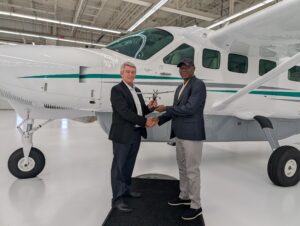
Joyce Mmereole Okoli
A maritime security expert, Captain Warredi Enisuoh has fualted the recent acquisition of a Cessna Grand Caravan EX-208B by the Nigeria Customs Service.
In his contribution on a maritime industry stakeholders platform on Whatsapp, Harboursandports on Monday, Captain Warredi questioned the choice of the purchase of the aircraft under the directive of Comptroller-General of Customs, Bashir Adewale Adeniyi.
He noted that though the intention of the acquisition is to enhance the Service’s air surveillance capabilities, he argued that investing in multiple drones would have been a more efficient and effective approach.
He further emphasized that amount spent on the aircraft acquisition could be used to get several drones that will provide superior surveillance capabilities due to their ability to cover multiple areas simultaneously and offer real-time tracking.
Captain Wareddi, who is also Executive Director Technical and Operations at Tantita Security Services Limited, siad “Multiple drones will cover multiple areas in real time. The moment you identify smugglers, you track them by placing a mark on the most prominent object.
“The drone will track and transmit the location of the suspect in real time. They cannot hide,” he explained.
He also noted that the decision to purchase a manned aircraft overlooks modern advancements in surveillance technology, which increasingly prioritize drones for their adaptability and effectiveness, particularly in night operations common along smuggling routes. He noted that drones are better suited for these types of missions, providing continuous coverage and minimizing the risks to personnel.
Captain Warredi’s critique echoes sentiments previously expressed by former Comptroller-General Hameed Ali, who also questioned the necessity and cost-effectiveness of acquisitions of such aircraft.
He highlighted the safety limitations of the Cessna Grand Caravan EX-208B, a single-engine aircraft, particularly for operations over water.
“As a single-engine aircraft, you cannot fly too far into the ocean. If that engine fails, you may not be able to glide to land. There are too many limitations,” Warredi stated, underscoring the importance of safety considerations.
He also pointed out that drones align more closely with the shift in modern warfare and surveillance strategies, which favor unmanned aerial vehicles (UAVs) for their flexibility, coverage, and reduced risk to personnel.
He noted, “Imagine shooting down this aircraft and the number of experts and years of experience you will lose at one go. Shoot down a drone, and you can replace it.”
Captain Warredi concluded by advocating for a more strategic approach to the Nigeria Customs Service’s surveillance operations.
He emphasized the importance of incorporating intelligence and expert guidance to enhance the agency’s effectiveness in combating smuggling and other illegal activities.

